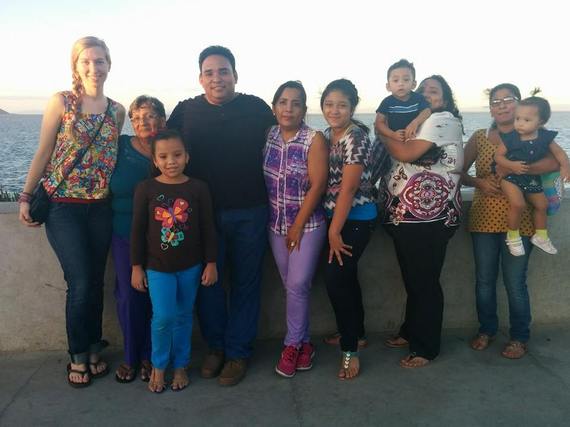"Keyler, ¿que haces?" What are you doing?
Two-year-old Keyler stares blankly, guiltily back at his mother, Sandra, as he finishes urinating on himself and all over the floor.
"¡Te orinaste!" You peed! "Ven pa'ca, te cambio el pañal." Come here, I'll change your diaper.
While Sandra changed her son's flimsy cloth diaper, Keyler's grandmother, Yolanda, mops the floor, soaking up as much pee as possible. From the couch just a couple of feet away, I can see the wet residue left behind on the tile, glimmering in the sunlight pouring in from the white front gate.
It's hot inside the little green house I am staying at in Managua, Nicaragua. The pee on the floor extenuates the humid air. I try not to let my internal grimace show and make a mental note to self: Remember not to step in the pee vicinity to avoid dry pee.
The family I stayed with last December for a week became my family. Yolanda, the grandmother and matriarch of the family was my primary caretaker for nine years of my young life. I was back visiting her years after I'd moved to the United States.
When I arrived in Managua, I was welcomed Nicaraguan-style. The girls, my new cousins, played with my hair, claiming I was princess Elsa from Disney's Frozen! I was given lots to eat--a rice and bean mixture, gallo pinto, with some fried cheese was my favorite. I was given the best bed in the house and a room to myself.
The week I spent experiencing their warmth, observing their routines and talking with family members brought out things I loved and things I cringed about in the way their family functioned.
Some things just didn't make sense. For instance, why would you use a diaper if it clearly doesn't hold the pee in? I know pee is sterile, but please use some disinfectant and get that pee off the floor!
When we took a trip to the pool, we sat around a picnic table waiting to eat. Keyler had been naked getting in and out of the pool, which is questionable but acceptable. But then, Sandra picks him up and plops him down right smack dab in the middle of the table. Bare bottom to bare table. Maybe the laissez-fare approach to sanitation is meant to build up the immune system.
Sanitary measures might not top the list of important practices for my Nicaraguan family. However, they coddled their children like nothing I've ever seen from this side of the border. All 12 people living in the house, across three generations, interacted with Keyler. The amount of stimulation, touch and social interaction he gets will prove developmentally beneficial.
We pride ourselves in the United States, especially compared with Latin American countries, in our progressive thinking on gender issues. Yet, the way I saw men--fathers, uncles and cousins--interact with Keyler proved our entitled assumption, specifically in relation to parenting roles, wrong. I see clearer representations of traditional gender roles in parenting in the United States than I did in Nicaragua. The greater involvement of men in their lives is a protective factor for children.
Unfortunately, the positive interactions I saw my new family having with a young child, turned to frustration with older children. Kelsi, 11, was treated like a servant, and she complied.
Patricia, Kelsi's aunt, reclines on the sofa in the living room. "Kelsi, dame un vaso de agua." Get me a glass of water. Kelsi immediately retrieves what her aunt demanded.
Later, as we lounge around in the living room, Patricia and Sandra complain, saying Kelsi is fat, mischievous and a pest. They are not concerned that Kelsi can hear every word. Even the family's matriarch, Yolanda, practically agrees.
Demanding things from Kelsi and bad-mouthing her in front of her face happened almost every day on my visit. I wish I had had the guts to stand up for her.
The lifestyle of my Nicaraguan family paints a messy but beautiful picture: small house, big family, good food, lots of touch, and sheer honesty. No white-picket fence, golden retriever or TV the size of Alaska. Instead, my family filled their time with tasks to survive like cooking, and walks around the block or simply conversing on the worn out couches in the living room. But the sense of community largely outweighed the material possession we cling to in the United States. My Nicaraguan family challenged me to live less like a hoarder and more like them.
